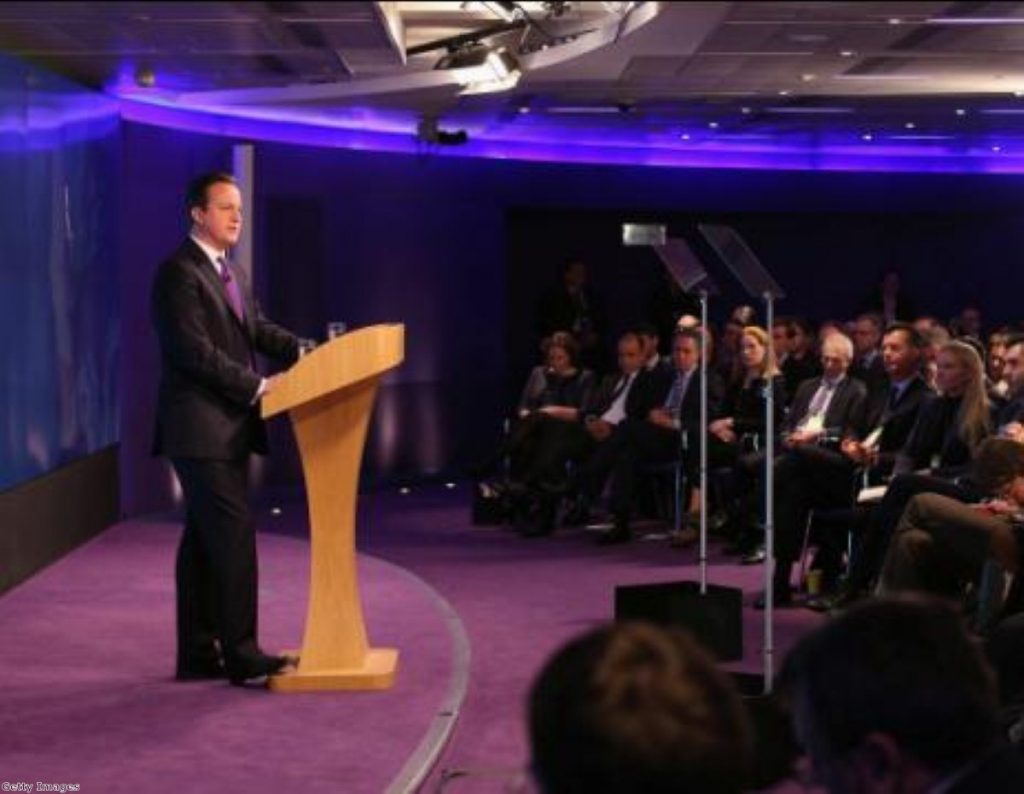Sketch: Ambassadors huff at Dave’s EU referendum heresy
David Cameron finally delivered his big speech on Europe this morning. It is a huge political gamble, one born of necessity and years of pressure from Conservative backbenchers, to promise an in-or-out referendum after an unknowable, open-ended negotiating process. Making this sort of move is a big deal, which is why it has been months in coming. And then delayed. Journalists, waiting for the speech to start, boasted about how early they had had to get up to get to Bloomberg's offices on time. A very early state for a very late speech.
The rustle of snapping photographers heralded Cameron's entry, followed by the prime minister's appearance. He was wearing a Ukip-purple tie, which just happened to match the deep purple hue of the glass-walled auditorium deep in the centre of Bloomberg's offices. He looked a little tired. But after being introduced by an American chief executive, David "CeeYAMeron" quickly got into his stride. He was playing this one with a very straight bat indeed, with next to no effort to make the most of his (admittedly sparse) supply of funnier lines.
The biggest laugh from the assembled business chiefs, diplomats and reporters came from a section addressing the risk Britain might find itself marginalised by the eurozone. "Let’s stop all this talk of two-speed Europe, of fast lanes and slow lanes, of countries missing trains and buses, and consign the whole weary caravan of metaphors to a permanent siding," the prime minister said. There was a slight murmuring of amusement from the assembled audience. Cameron seemed bland, on autopilot. He was nearer the everyman politician, devoid of personality and polished into facelessness, than he has ever been.
Which made all the odd little phrases he used stand out all the more. British consent was "wafer thin", a phrase instantly associated in the minds of many juveniles with Monty Python's hopelessly obese Mr Creosote. Those denouncing calls for change were mocked for "heresy", which didn't stop Cameron putting forward his own "heretical propositions". His was a speech of threats, some more brazenly made than others. The EU would be "greatly diminished" by Britain's departure, he suggested.


If a grown-up baby were to hold a well-attended, much-reported speech to announce it had no choice but to throw all its toys out of the pram, and was preparing to give its teddy bears a vote on whether to leave the family unit altogether, it would look something like this.
"Do you know who I am?," the dignified dignitary puffed up in front of me, as I proffered a microphone to him directly after David Cameron had walked off the stage. I did. His label stated very clearly he was the government of Finland's ambassador to the United Kingdom. The speech would lead to "uncertainty" in Europe, he said. But he wouldn't go so far as to call it a threat. He couldn't think of a better word, and in any case was in a hurry. He and the other ambassadors present were retreating to a private space, which normally functions as the Bloomberg office's dining room, to harangue the Europe minister David Lidington. This is the start of a blizzard, not a flurry, of diplomacy.
Those representing foreign governments might have something to worry about, but the overseas business leaders I spoke to afterwards seemed to be more pliant with Cameron's message. One of them I approached wasn't keen on a full interview. He demurred by simpering: "You have a great prime minister." This speech will certainly change the way the world views Cameron.












